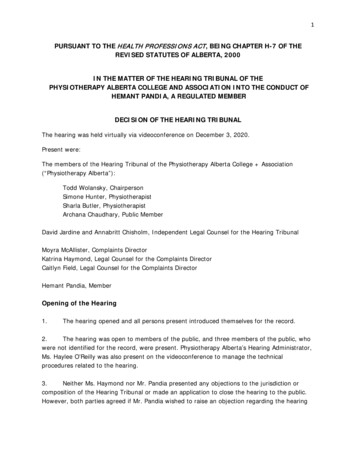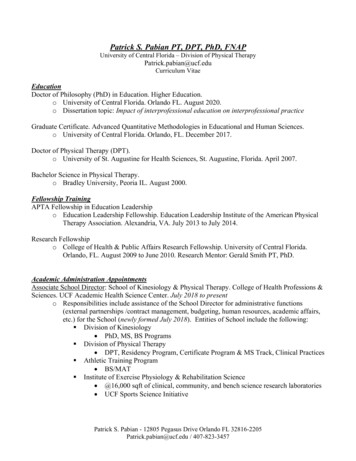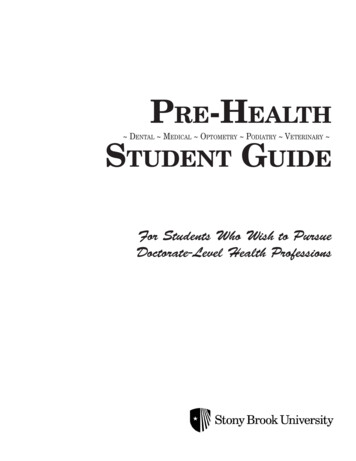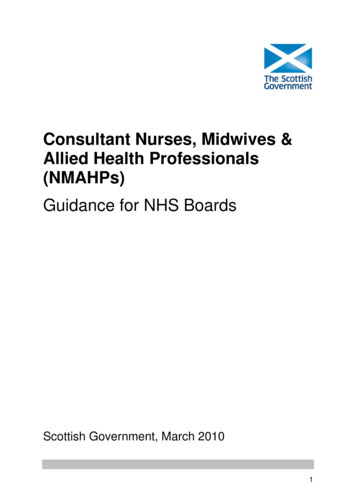
Transcription
1PURSUANT TO THE HEALTH PR OFESSI ON S ACT, BEING CHAPTER H-7 OF THEREVISED STATUTES OF ALBERTA, 2000IN THE MATTER OF THE HEARING TRIBUNAL OF THEPHYSIOTHERAPY ALBERTA COLLEGE AND ASSOCIATION INTO THE CONDUCT OFHEMANT PANDIA, A REGULATED MEMBERDECISION OF THE HEARING TRIBUNALThe hearing was held virtually via videoconference on December 3, 2020.Present were:The members of the Hearing Tribunal of the Physiotherapy Alberta College Association(“Physiotherapy Alberta”):Todd Wolansky, ChairpersonSimone Hunter, PhysiotherapistSharla Butler, PhysiotherapistArchana Chaudhary, Public MemberDavid Jardine and Annabritt Chisholm, Independent Legal Counsel for the Hearing TribunalMoyra McAllister, Complaints DirectorKatrina Haymond, Legal Counsel for the Complaints DirectorCaitlyn Field, Legal Counsel for the Complaints DirectorHemant Pandia, MemberOpening of the Hearing1.The hearing opened and all persons present introduced themselves for the record.The hearing was open to members of the public, and three members of the public, who2.were not identified for the record, were present. Physiotherapy Alberta’s Hearing Administrator,Ms. Haylee O’Reilly was also present on the videoconference to manage the technicalprocedures related to the hearing.Neither Ms. Haymond nor Mr. Pandia presented any objections to the jurisdiction or3.composition of the Hearing Tribunal or made an application to close the hearing to the public.However, both parties agreed if Mr. Pandia wished to raise an objection regarding the hearing
2being open to the public later on in the proceedings, the Complaints Director could address hisobjections at that time.4.The Hearing Tribunal provided the parties with an opportunity to raise any additionalpreliminary matters. The parties indicated they were ready to proceed.5.Prior to the hearing, the Hearing Tribunal was given a password protected electronicpackage containing an Agreed Statement of Facts and an Acknowledgement of UnprofessionalConduct with attached documents marked as Tabs 1-18. Once the hearing commenced, theHearing Tribunal was provided with the password for the document package, which wasentered as Exhibit 1 to the hearing.6.The Notice of Hearing was attached as Tab 15 to Exhibit 1 and indicated the followingallegation was before the Hearing Tribunal:TAKE NOTICE THAT on December 3, 2020, commencing at 9:00 a.m. by Zoom VideoConference, a Hearing Tribunal of Physiotherapy Alberta ‐ College Association(“Physiotherapy Alberta”) will conduct a hearing into allegations that you engaged inunprofessional conduct in that:1. Despite being advised by your employers on numerous occasions that yourpatient charts do not meet required standards, you failed to maintain timely,adequate and/or any records in relation to the treatment provided to clientJ.L. from April 17, 2019 – May 22, 2019.7.The Chair reviewed the Notice of Hearing and asked Mr. Pandia if he admitted or deniedthe allegation. Mr. Pandia stated that he admitted to the allegation.Submissions of the Complaints Director8.Ms. Haymond reviewed that Mr. Pandia had been a registered member of PhysiotherapyAlberta on its general register since 2005 and on its provisional register since 2003. Sheexplained that Mr. Pandia worked at Lifemark Stony Plain beginning in 2003 and ending whenhe started working full-time at Lifemark Millwoods in 2011. In addition, in 2015, he startedworking part-time at PT Health Belmead (“PT Health”) and he remained there part-time untilMay 23, 2019, when his contract was terminating following the complaint to PhysiotherapyAlberta that resulted in this hearing.9.In respect to the details of the complaint, Ms. Haymond stated that the complaint wasmade by J.L. on October 3, 2019. The complaint described that J.L was in a motor vehicleaccident in September, 2018 and she attended physiotherapy at PT Health with Mr. Pandia.
3When J.L’s lawyer subsequently requested a copy of J.L’s chart notes for a concurrent civilclaim, it was noted that Mr. Pandia’s initial assessment and notes were not included in her file.10.Ms. Haymond stated that Mr. Pandia’s response to the Complaints Director was verycandid in acknowledging that he had not kept proper documentation and that he had beenterminated by his employer, so was unable to rectify the situation. In his response, Mr. Pandiaprovided a copy of J.L.’s billing records, which show that he assessed J.L. on April 17, 2019 andthat she was treated at PT Health on six occasions until June 4, 2019. During that time, hemade one chart entry relating to J.L. on the date of her assessment, but he failed to make otherchart entries at the time he provided treatment. Additional chart entries for the treatmentsprovided in April and May, 2019 were created in October, 2019.11.Ms. Haymond submitted that Mr. Pandia’s employment record from PT Health showedthat the issue of incomplete chart notes had been raised in regards to other patients, despitenumerous requests from his employers to complete the charts on a timely basis. The issue israised in his employment file, beginning on July 30, 2018, and in three subsequent letters datedOctober 22, 2018, February 25, 2019 and May 23, 2019. Ms. Haymond submitted that theinformation from PT Health indicates that charting was a long-standing issue for Mr. Pandia andthat his supervisors brought it to his attention.12.Ms. Haymond explained that as a result of the employment record from PT Health, theComplaints Director also sought information from Lifemark. Lifemark’s response demonstrated asimilar pattern of Lifemark bringing the issues to Mr. Pandia’s attention as far back as 2013 andthat the charting issues led to performance improvement discussions.13.Ms. Haymond suggested that the evidence attached to the Agreed Statement of Factsdemonstrated that the complaint from J.L. regarding Mr. Pandia’s charting was not an isolatedincident. She submitted that the evidence before the Hearing Tribunal should be sufficient for itto find that the allegation in the Notice of Hearing is proven on a balance of probabilities andthat it constitutes unprofessional conduct as defined in the Health Professions Act .14.Finally, she noted Mr. Pandia admitted to the allegation and agreed his conduct breachedthe Code of Ethical Conduct, including responsibilities to the client to practice in a safe,competent, accountability and responsible manner and to comply with all legislative guidelinesand regulatory requirements. Mr. Pandia’s admission also acknowledged he breached theStandards of Practice: Documentation and Record Keeping that apply to the profession.15.Based on this evidence, Ms. Haymond submitted that Mr. Pandia had failed to meet theminimum requirements expected in relation to his patient J.L. and that the evidence shows hisdocumentation practices were in issue for a lengthy period of time, beginning in 2013.
4Submissions of Mr. Pandia16.Mr. Pandia agreed that he did not finish his charting regularly and that this behaviourwarranted a finding of unprofessional conduct. He stated that he had difficulty finishing hischarting as he was working two jobs and was taking care of his two young children alone. Healso submitted that he struggled with typing his notes into the new electronic system in 2018,all of which contributed to his inability to complete his charting in a timely matter.17.Mr. Pandia stated that his earlier issues dating back to 2013 were not regarding dailycharting but instead were reports that he had failed to complete in a timely matter.18.In conclusion, Mr. Pandia submitted that, while he was making his best effort, hisconduct did not meet the standards of Physiotherapy Alberta.Further Submissions of the Parties19.The Hearing Tribunal adjourned to review Exhibit 1 and consider the parties’submissions. When the hearing resumed, Mr. Pandia clarified that his issues with daily chartingbegan in 2018 and that the documentation issues dating to 2013 were in respect to internalcompany requirements.20.Ms. Haymond submitted that, in the Agreed Statement of Facts, Mr. Pandiaacknowledged that he received numerous warnings from employers dating back to 2013regarding his failure to keep documentation, and that these prior warnings and issues wererelevant to the sanctions portion of the hearing. She submitted that it was open to the HearingTribunal to review Mr. Pandia’s employment records from 2013, but that the facts agreed towere in support of a finding that his charting and documentation was a long-standing issueraised by his employers.Questions from the Hearing Tribunal21.The Hearing Tribunal asked Mr. Pandia if he had considered taking additional courses orprograms to improve his charting.22.Mr. Pandia stated that he had not taken any courses but that it was not his charting thathe struggled with but his time restrictions and difficulty typing into the electronic system. Healso submitted that he was facing mounting financial pressure and struggled to focus. He statedthat his chart notes were not getting done as a result of the entirety of his circumstances.23.He submitted that he did try and explain his circumstances to his employers, and whilethey were cooperative and did try to make allowances to an extent, they were limited. The newsoftware for electronic notes compounded his issues.
524.The Hearing Tribunal next asked Mr. Pandia if he was changing his agreement to thefacts submitted in Exhibit 1. Mr. Pandia replied that he was not changing his agreement or hisadmission, he merely wanted to clarify his circumstances.Decision of the Panel on the Issue of Unprofessional Conduct25.After briefly adjourning to review the Agreed Statement of Facts and Acknowledgmentof Unprofessional Conduct and appendices and to consider the submissions of both parties, theHearing Tribunal returned and advised that it accepted the acknowledgment of unprofessionalconduct and found that the alleged conduct is proven and constitutes unprofessional conduct.26.The Hearing Tribunal next invited submissions on sanctions.The Joint Submission on SanctionsSubmissions of the Complaints Director27.Ms. Haymond submitted that the parties were prepared to present a partial JointSubmission on Sanctions. She provided the Hearing Tribunal with the password for threedocuments provided to it in advance of the hearing: the partial Joint Submission on Sanctions,the case of Jaswal v Newfoundland Medical Board, and information relating to two medicaldocumentation courses. The partial Joint Submission on Sanctions was marked as Exhibit 2 andthe information relating to courses was marked as Exhibit 3.28.Ms. Haymond submitted that as set out in the partial Joint Submissions on Sanctions,the Complaints Director and Mr. Pandia were requesting that the Hearing Tribunal make thefollowing orders under section 82 of the Health Professions Act:1.Mr. Pandia shall receive a reprimand and the Hearing Tribunal’s decision shallserve as a reprimand.2.Mr. Pandia will pay 50% of the costs of the investigation and hearing, to be paidwithin a period of 12 months from the date Physiotherapy Alberta sends him aletter advising him of the final amount of costs, in accordance with a paymentschedule agreed to by the Complaints Director.3.The following conditions will be placed on Mr. Pandia’s practice permit:(a)Mr. Pandia will provide the Complaints Director with written confirmationthat he has read and reviewed the following documents, within 30 days ofbeing sent a copy of the Hearing Tribunal’s written decision:
6(b)(i)Code of Ethical Conduct; and(ii)Standard of Practice – Documentation and Record Keeping.Mr. Pandia will be required to undergo periodic chart audits conducted bythe Complaints Director or a reviewer appointed by the ComplaintsDirector, subject to the following:(i)The Complaints Director will determine whether to conduct thepractice review herself, or to appoint a regulated member ofPhysiotherapy Alberta to act as a reviewer and to conduct the chart audits(the “Reviewer”);(ii)If a Reviewer is appointed, the reviewer will be provided with acopy of the Hearing Tribunal’s written decision;(iii)The Complaints Director or Reviewer will conduct three chartaudits over a period of 18 months, at (approximately) six month intervals;(iv)Mr. Pandia will provide the Complaints Director or Reviewer withaccess to or complete copies of a random sample of 10 patient charts, tobe selected by the Complaints Director or the Reviewer, containing alltreatment and financial records relating to the patient, per audit;(v)The first audit will commence within a period of time to bedecided by the Complaints Director, commencing no later than 16 weeksafter the date of the Decision of the Hearing Tribunal;(vi)Upon conclusion of each audit, the reviewer will provide a writtenreport to the Complaints Director indicating whether Mr. Pandia’s chartsdemonstrate compliance with Physiotherapy Alberta’s Standard of Practice– Documentation and Record Keeping, and any areas for improvement;and(vii)Mr. Pandia will be responsible for the costs of the audit, to amaximum of 400.00 per audit, to be paid to Physiotherapy Alberta within30 days of receiving the invoice.4.The orders set out above at paragraphs 2-3 will appear as conditions on Mr.Pandia’s practice permit and on the public register, and each of the conditionswill be removed once each order has been completed.5.Should Mr. Pandia be unable to comply with any of the above deadlines forcompletion of the orders identified above, he may apply to the ComplaintsDirector for an extension, by submitting a written request and the reason for his
7request at least 7 days prior to the deadline. Extensions may be granted in thesole discretion of the Complaints Director.6.Should Mr. Pandia fail to comply with any of the above orders, or should theComplaints Director/Reviewer determine that the results of one of more auditsare unsatisfactory and the issues identified are not likely to be remediated duringthe course of the subsequent audits, the Complaints Director may do any or all ofthe following:(a) Treat Mr. Pandia’s non-compliance as information for a complaint under s. 5of the Health Professions Act;(b) In the event that the Complaints Director determines that the results of oneor more audits are unsatisfactory and the issues identified are not likely to beremediated, treat the information as a complaint under s. 56 of the HealthProfessions Act, in which case any remaining audits may be suspended in thediscretion of the Complaints Director;(c) In the case of failure to provide proof of completion of the orders set out inparagraphs 3(a), or of failure to provide or make available charts to the revieweras outlined in paragraph 3(b), Mr. Pandia’s practice permit will be suspendeduntil he complies;(d) In the case of non-payment of the costs referred to in paragraph 2, or thefailure to pay costs in accordance with the schedule agreed upon, or the failureto reimburse Physiotherapy Alberta for the costs of the chart audits as referred toin paragraph (3)(b)(vii), Mr. Pandia’s practice permit will be suspended until hehas paid outstanding costs; and/or;(e) Refer the matter back to a hearing tribunal for further direction.29.Ms. Haymond also submitted an order requested by the Complaints Director but notagreed on by Mr. Pandia: that within three months of being sent the written decision, he willprovide proof to the Complaints Director that he has successfully completed either the PBIeducation course on medical recordkeeping or the CPEP medical recordkeeping seminar, at hisown expense.30.Ms. Haymond stated that the Hearing Tribunal was tasked first, with determiningwhether to accept the partial joint submission on sanctions and then, whether it to order therecord keeping course as requested by the Complaints Director. She noted that when theHearing Tribunal considered the orders that had been jointly proposed, it was important tounderstand that the purpose of sentencing in the context of professional discipline is to ensurethat the public is protected from similar conduct in the future.
831.She indicated that from the Complaints Director’s perspective, the requested orderswould hopefully improve Mr. Pandia’s performance and mitigate the risk of him coming beforethe Hearing Tribunal on a future occasion and ensure that his recordkeeping practice comes upto the expected standards of the profession.32.Ms. Haymond submitted that some of the factors the Hearing Tribunal could consider inassessing penalty are set out in the case of Jaswal v Newfoundland Medical Board, which is acase that is often considered in deciding whether to accept submissions on penalty or whetherorders are appropriate. She reviewed the factors as they applied to this case:a. The nature and gravity of the proven allegations: while not the most serious ofallegations, the requirements to maintain accurate and timely charts are acornerstone of physiotherapy practice; not an add-on. Charting is critical to thetreatment that is provided because it contains previous assessments, rationale fortreatment and allows the physiotherapist to track the progress made by the patientand determine whether the interventions being applied are appropriate. The fact thatthis was brought to Mr. Pandia’s attention on numerous occasions and persistedthrough to his treatment of J.L. in 2019 makes it a more serious issue.b. The age and experience of the member: Mr. Pandia has been registered withPhysiotherapy Alberta since 2003, at first on the provisional register, but since 2005on the general register. He is not a new member of the profession and he shouldunderstand the fundamental importance of charting and be able to implement it nomatter what is going on in his life.c. The previous character of the member and whether there are prior complaints orconvictions: Mr. Pandia has not been the subject of any prior complaints to thePhysiotherapy Alberta and so this is a mitigating factor.d. The number of times the offence occurred: the evidence is specific to the chartingdeficiency with respect to J.L.’s chart. However, Allegation 1 is worded to capturethe fact that Mr. Pandia received warnings previously and that this was a longstanding issue. Ms. Haymond referred to page 220 of the Agreed Statement of Factsto note the evidence that on August 19, 2019, Mr. Pandia’s employer noted he hadchart notes overdue for up to two years (dating back to August, 2017). She alsoreferred to page 238 of the Agreed Statement of Facts which stated that there wereconcerns dating back to 2013 that Mr. Pandia was not completing documentation ina timely way. Finally she referred to Mr. Pandia’s performance evaluation agreementon page 236 of the Agreed Statement of Facts that set out that Mr. Pandia struggledwith paperwork and required multiple reminders to complete forms.
9e. The role of the member in acknowledging what occurred: This is a significant andmitigating factor as Mr. Pandia has acknowledged his conduct and admitted toAllegation 1 in the Notice of Hearing.f.Whether the member has suffered other consequences as a result of the allegations:In this case, Mr. Pandia’s agreement with PT Health was terminated as a result of hischarting issues.g. The impact on the patient: In J.L.’s letter of complaint she indicated she had been ina motor vehicle accident, retained a lawyer and needed her records for her civilclaim. It is clear that Mr. Pandia’s failure to chart in a timely way had a negativeimpact on those proceedings.h. The need for specific and general deterrence: There is a need for specific deterrencein this case so that Mr. Pandia does not engage in similar conduct in the future.Having Mr. Pandia attend at the hearing and then be ordered to participate in thechart review and audit for 18 months is how the Complaints Director hopes toachieve the goal of specific deterrence. The Complaints Director also views theconduct as serious enough that a message needs to be sent to the other members ofthe profession, through the sanction orders made in this case, to deter them fromengaging in similar conduct in the future.i.The range of sentence in similar cases: It’s very rare for a charting issue to come toa hearing, as often they are resolved informally. However, in this case, the conductwas serious enough that a hearing was warranted.33.Ms. Haymond noted that with respect to the reprimand, the Hearing Tribunal could useits decision to send whatever message it felt was important to send to Mr. Pandia and to theother members of the profession.34.With respect to costs, Ms. Haymond stated that the partial Joint Submission onSanctions sought an order for Mr. Pandia to pay 50% of the costs of the investigation andhearing over a period of time. She estimated that costs would be in the range of 18,500 by thetime the hearing was completed, but that it could be more. She submitted that costs are notintended to be a penalty but instead are intended to indemnify Physiotherapy Alberta for costsassociated with the discipline process. In this case, Ms. Haymond suggested that request forMr. Pandia to pay 50% of the costs strikes a balance that reflects that a member who is guiltyshould bear a portion of the costs and that the rest of those costs ultimately get absorbed bymembers of the profession through their membership fees.
1035.She submitted that the order for the chart audits is appropriate because it will determinewhether Mr. Pandia can implement changes to his practices over time and, if there are furtherconcerns, there is a mechanism to refer back to the Hearing Tribunal for further consideration.36.Ms. Haymond also reviewed Exhibit 3, which included descriptions of the two coursesthat the Complaints Director proposed that Mr. Pandia be required to take. Ms. Haymondsubmitted, that despite Mr. Pandia’s statements that his charting issues arose as the result ofstressors in his life, the history of concerns raised by his employers suggests that a course maybe useful to ensure that he has the tools and skills he needs to be able to implement therequired changes to his practice and understand the importance of charting going forward.37.Finally, Ms. Haymond referenced the case of R v Anthony Cook to submit that while theHearing Tribunal is not obligated to accept the Joint Submission on Sanctions, the courts havesaid there is a high degree of deference unless the joint submission would bring theadministration of justice into disrepute. She suggested that if the Hearing Tribunal did haveserious concerns about what is proposed then as a matter of fairness, it should advise theparties of its concerns and give them a chance to respond before issuing the final order.38.Ms. Haymond noted that this deference did not apply to the Complaints Director’srequest for an order that Mr. Pandia complete the recordkeeping course, because there was nojoint submission on that issue. In respect to this request, the Hearing Tribunal must determinewhether it is an appropriate sanction to order.Submissions of Mr. Pandia39.Mr. Pandia submitted that he was not against the course, but that he did not think acourse would correct the issues that had arisen that prevented him from charting in a timelymanner. He indicated that at the time he had these issues, he was mentally stressed and in therole of a single parent. Since the beginning of 2020 he has gotten his life back so his charts areup to date for this year. He noted that he had been meeting with the clinic director where he iscurrently employed and that charting is not an issue.40.He stated that he recognized that he should not have let his situation in life put hischarting aside. He submitted that he did not think the courses would help him now but that hewas not against taking one if that is what the Hearing Tribunal ordered him to do.Questions from the Hearing Tribunal41.In response from a question from the Hearing Tribunal, Mr. Pandia suggested thatbefore ordering the course it may be more beneficial for someone to review his current chartingfirst to see if he needs the course. He stated that now that the other stressors are no longer
11present, he personally feels that the course would only reiterate what he already knows aboutcharting.42.In response to another question from the Hearing Tribunal, Mr. Pandia agreed that hisfailures were not due to his lack of knowledge on how to chart but the logistical constraints ofgetting things done.43.Before the Hearing Tribunal adjourned to deliberate on the sanction submissions, Ms.Haymond reviewed the course summaries in Exhibit 3 and submitted that one of the points ofthe coursework is to gain skills to develop habits to incorporate charting practices in regular androutine habits.Decision of the Hearing Tribunal on the Joint Submission on Sanctions44.The Hearing Tribunal adjourned again and when it returned, it advised the parties that itwas prepared to accept the partial Joint Submissions on Sanctions. It also advised that it wasprepared to order that Mr. Pandia provide proof to the Complaints Director that he hassuccessfully completed either the PBI education course on medical recordkeeping or the CPEPmedical recordkeeping seminar, at his own expense, within three months of receiving theHearing Tribunal’s written decision.Reasons of the Hearing Tribunal on the Issue of Unprofessional Conduct45.The Hearing Tribunal considered the admission of unprofessional conduct made by Mr.Pandia at paragraphs 29 to 32 of the Agreed Statement of Facts and Acknowledgement ofUnprofessional Conduct marked as Exhibit 1.46.In assessing Mr. Pandia’s admissions the Hearing Tribunal considered paragraphs 1 to28 of the Agreed Statement of Facts and the documents marked as Tabs 1 to 18 of Exhibit 1,including the letter of complaint from J.L., Mr. Pandia’s written response, treatment records forJ.L., and employment records for Mr. Pandia from Lifemark Physiotherapy and PT Health.47.Based on the Agreed Statement of Facts, the supporting documents in Tabs 1-18 andMr. Pandia’s admission of unprofessional conduct in paragraphs 29 to 32 of the AgreedStatement of Facts and Acknowledgement of Unprofessional Conduct (Exhibit 1), the HearingTribunal finds Allegation 1 in the Notice of Hearing is proven and constitutes unprofessionalconduct. J.L. was the patient impacted by Mr. Pandia’s charting failures. However, the evidencebefore the Hearing Tribunal is also that Mr. Pandia has experienced issues with charting for anumber of years and has received feedback from his employers to that effect on multipleoccasions.
1248.The Hearing Tribunal also accepts Mr. Pandia’s admission of unprofessional conductconcerning the alleged breaches of the Code of Ethical Conduct and the Standards of Practice:Documentation and Record Keeping. Based on the evidence presented and Mr. Pandia’sadmissions, the Hearing Tribunal finds that these breaches constituted unprofessional conduct.49.The Hearing Tribunal acknowledges that Mr. Pandia was dealing with a significantamount of responsibility and stress during at least a portion of the events leading to thishearing. However, as a regulated member on the general register of Physiotherapy Alberta, Mr.Pandia had an obligation to complete his patient’s charts in a timely and accurate manner. Inthis case, he failed to do so and his patient, J.L., was impacted when she required her chart fora civil claim related to her reason for seeking treatment.50.Mr. Pandia’s conduct breached the Standards of Practice and the Code of EthicalConduct and he failed to practice in a manner that demonstrated accountability andresponsibility for the care he provided to J.L. Overall, this is conduct that harms the integrity ofthe profession in the eyes of the public because it suggests that a physiotherapist cannot becounted on to maintain the Standards of Practice the Code of Ethical Conduct required by theprofession.51.The Hearing Tribunal finds that the proven conduct set out in Allegation 1 demonstratesa lack of skill or judgment in the provision of professional services, a failure by Mr. Pandia tomeet the Code of Ethical Conduct and the Standards of Practice for Physiotherapists in Alberta:Documentation and Record Keeping and is conduct that harms the integrity of the profession,all of which is unprofessional conduct as defined by sections 1(1)(pp)(i), (ii) and (xii) of theHealth Professions Act.Reasons of the Hearing Tribunal on the Issue of Sanctions52.The Hearing Tribunal has the authority under section 82 of the Health Professions Act toorder sanctions after making findings of unprofessional conduct. The Hearing Tribunal finds thatthe proposed sanctions in the partial Joint Submission on Sanctions fall within that order, asdoes the order requested by the Complaints Director for Mr. Pandia to complete an educationalcourse on record keeping.53.The Hearing Tribunal accepts that it has a duty to give careful consideration to a partialJoint Submission on Sanctions made by a member and the Complaints Director. The HearingTribunal considered the Agreed Statement of Facts and Acknowledgement of UnprofessionalConduct and its Tabs 1-18 (Exhibit 1), the partial Joint Submission on Sanctions (Exhibit 2), theinformation on the record keeping courses (Exhibit 3) and the submissions made on behalf ofboth parties. The Hearing Tribunal also considered the factors in Jaswal, including theseriousness of the conduct, the fact that the conduct was a single instance of conduct that
13occurred after numerous warnings to Mr. Pandia from multiple employers, the need for specificand general deterrence and Mr. Pandia’s cooperation and admission of unprofessional conduct.54.The Hearing Tribunal first addressed the proposed sanctions in the partial JointSubmission on Sanctions and finds that they are reasonable having regard to the evidencepresented in this case and based on the admitted conduct. The Hearing Tribunal finds that theorders set out in the
The members of the Hearing Tribunal of the Physiotherapy Alberta College Association ("Physiotherapy Alberta"): Todd Wolansky, Chairperson . Simone Hunter, Physiotherapist . Sharla Butler, Physiotherapist . Archana Chaudhary, Public Member . David Jardine and Annabritt Chisholm, Independent Legal Counsel for the Hearing Tribunal











